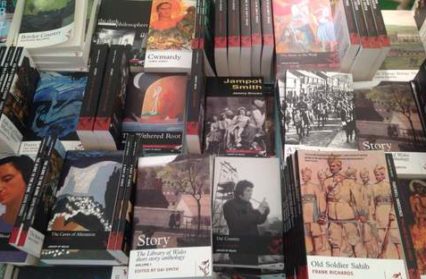Series editor of The Library of Wales series, professor Dai Smith, looks over the achievements and ambitions of the project as it hits its fiftieth title.
Sometimes the ground does shake. And when it does we need to be certain to build on firm foundations for the future. In the past decade in Wales we have felt the tremors of cultural aftershock, and the hopefulness which comes when we understand the roots of our historic commonality as a people and as citizens of a still emergent democracy. The key to it has been, at long last, the open, widespread and welcome recognition that the English language, as used in Wales, is indeed the Dragon’s other tongue, and, notwithstanding the primacy and centrality of Welsh, that it was through English that the beat and pulse of the majority of Welsh lives over the course of the twentieth century was experienced and articulated.
This is what the Culture Committee of the Welsh Assembly was told in 2004 by scholars and writers and readers who wanted the people of Wales to be given their just due: full, attractive and unfettered access to a rich, but serially neglected, tradition of English-language literature about and from Wales. Hitherto, the vagaries of the market and a residual academic snobbery, elevating only a handful of names as worthy of attention, had conspired to marginalise or silence a wider and deeper achievement. Despite some gallant efforts over the years, how we had been re-presented through the imagination of generations of our writers was not commonly available. Work was out-of-print or not there for the general reader. We needed to hear a chorus of eloquent voices, not the songs of a few soloists, however well they had sung.
The Culture Minister listened to the cross-party committee, and he acted by inviting me to report on the feasibility of a proposed Library of Wales. On accepting my enthusiastic and positive conclusions, he invited me to serve as the Series Editor and turn the vision into a tangible reality. There would be no reward without risk but a democratic will was about to trump the faint-hearted and the cynical. On a larger scale, as the earth shook a little, it can be said that without the existence of a devolved Welsh government from the early years of this century there would have been no seismic cultural change at all. No National Theatre Wales as a creative force in English to transform the theatrical landscape. No education through the arts via a programme, match-funded by government and the arts council, to undertake a world-class initiative across all our schools. And, categorically, no Library of Wales.
Well, here we are, a dozen years on since the Minister, Alun Pugh, additionally funded the Wales Books Council to administer the project and oversee the publication of fifty volumes by Parthian Books. Translations, theatrical adaptations, debate and discussion, critical and creative engagements, broadcasts and biography, festivals and seminars, have all sprung from this great endeavour. Nor is it over with this milestone reached. So much gained that there can be no retreat from this position. I am confident that this building block of and for the culture and society of Wales will go from strength to strength to secure our future as an aware and self-conscious people. The late first Minister, Rhodri Morgan, who knew a thing or two about what makes the heart of a nation beat true, said publicly of the Library of Wales that it was “The greatest single achievement of the Welsh Assembly Government”.
What an accolade for the novels, poetry, journalism, memoirs, short stories, novellas and anthologies which, together, now make up the Library of Wales. It is a collection of writings which conveys the complexities of the people of Wales from every corner of our distinctive country. Their time in the space of Wales thus enters our contemporary sensibilities and informs our ongoing creative practice. The mosaic is not complete, and in one sense that is the point of it. We can keep adding to it as we change and grow, but we no longer have to live without its design and pattern. Crucially, in our schools and our colleges and our universities, and in the minds of all the readers of the Library of Wales, the Welsh who were live again in our imagination so that the Welsh who are coming may be confident of their roots as they proclaim our story to a wider world.
The Library of Wales series are available from Parthian.












